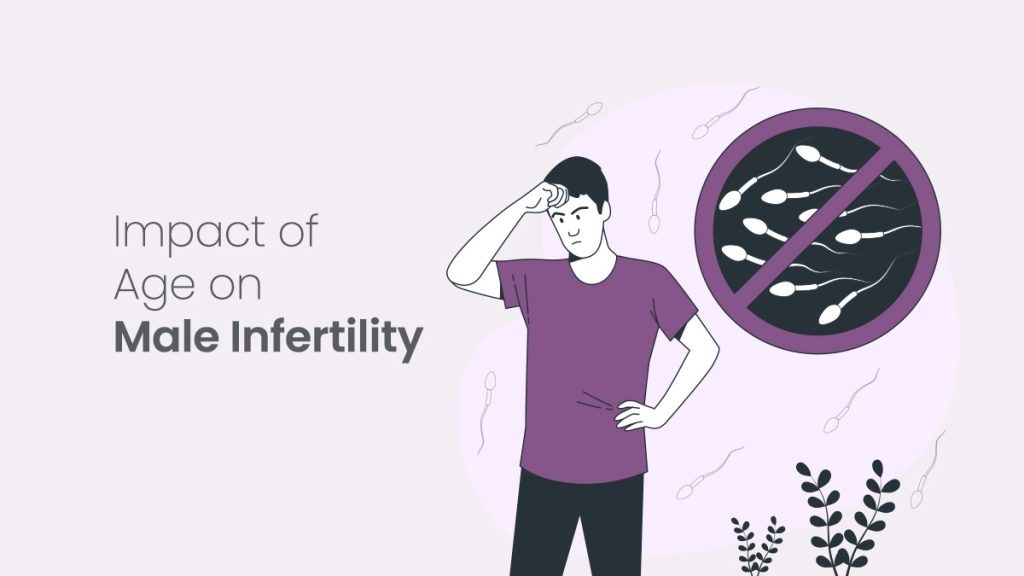When it comes to fertility, women’s biological clocks often take centre stage. But did you know that men, too, have a ticking clock of their own? The reality is that male fertility and age are closely connected. As men age, their fertility gradually diminishes in ways that can affect a couple’s ability to conceive. Understanding how age impacts male fertility is crucial for those planning families. Let us look at male fertility and how age affects it so we can better understand the challenges men might face and the steps they can take to address them.
What is Male Fertility?
Male fertility primarily hinges on the production, quality, and movement of sperm. Healthy sperm production relies on the testes functioning correctly, which produce millions of sperm daily. Sperm quality depends on its morphology (shape) and motility (movement).
Ways in Which Age Affects Male Fertility
1. Sperm Quality Decline:
One of the critical issues with male fertility and age is the decline in sperm quality. As men become older, the morphology and motility of their sperm decrease. This makes it harder for the sperm to meet the egg. Sperm that do not move properly cannot swim to the egg easily. Morphological abnormalities can also reduce the sperm’s ability to penetrate and fertilize the egg. These changes often result in reduced fertility rates among older men.
2. Low Semen Volume:
Another age-related change in male fertility is the gradual decline in semen volume. Less semen means fewer sperm are available for fertilization, making it harder to have a baby. It is important to note that the semen volume varies widely among men. Yet, older men generally produce less semen, impacting their ability to father a child.
3. DNA Fragmentation:
As men get older, the DNA in their sperm breaks apart more, leading to DNA fragmentation. This makes it harder for a healthy embryo to grow. It also raises the chances of losing the pregnancy.
4. Increased Risk of Health Conditions:
Age-related health conditions like hypertension and diabetes can indirectly affect male fertility. These conditions impact overall health and can cause sexual dysfunction, which directly affects their ability to have father children. Also, some medications used to manage these conditions can harm men’s sperm production and function.
Other Non-Age-Related Factors That Influence Male Reproductive Health
Understanding male fertility requires a deep dive into the various factors that can influence reproductive health. Here are the key non-age-related factors that can impact male reproductive health:
Genetics:
- Inherited Disorders: Genetic conditions like Klinefelter syndrome or Y-chromosome microdeletions can impair sperm production.
- Family History: A family history of infertility can increase the risk of similar issues.
Lifestyle:
- Diet: Nutritional deficiencies can affect sperm quality, count, and motility.
- Exercise: Regular physical activity boosts overall health, but excessive exercise can negatively affect hormone levels.
- Substance Use: Smoking, excessive alcohol consumption, and usage of recreational drugs can lead to reduced sperm count and quality.
- Stress: Chronic stress can alter hormone levels, disrupting sperm production.
Environmental Exposure:
- Toxins and Chemicals: Exposure to pesticides, heavy metals, and other chemicals can impair sperm production.
- Radiation: Regular exposure to radiation or heat can damage sperm cells and lower sperm count.
- Endocrine Disruptors: Chemicals that mimic or interfere with hormones, like BPA, can affect reproductive health.
Medical Conditions:
- Infections: STIs, mumps, and other infections can damage the reproductive tract.
- Varicocele: Enlarged veins in the scrotum can have a negative impact on sperm production and quality.
- Hormonal Disorders: Imbalances in testosterone or other hormones can disrupt sperm production.
Occupational Hazards:
- Long Sitting Hours: Prolonged sitting, especially in hot environments, can impact sperm production.
- Chemical Exposure: Working in industries with chemical exposures can elevate the risk of infertility.
Sexual Health:
- Erectile Dysfunction: Conditions affecting erectile function can hinder the ability to conceive naturally.
- Sexually Transmitted Infections: Infections can damage the reproductive system and impact fertility.
Obesity:
- Obesity is linked with lower testosterone levels, increased estrogen levels, and a higher likelihood of developing erectile dysfunction.
- It can lead to a higher incidence of sperm DNA damage, reduced sperm motility, and a lower sperm count.
Uncontrolled Diabetes:
- High blood sugar levels can damage blood vessels and nerves, leading to erectile dysfunction.
- Diabetes can cause hormonal imbalances that negatively affect sperm production and quality.
Taking Care of Age-Related Fertility Issues in Men
1. Lifestyle Changes:
A few changes to your current lifestyle can help decrease the impact of age-related fertility issues. A healthy, well-rounded diet rich in antioxidants, vitamins, and minerals can support sperm health. Regular exercises are beneficial. Steer clear of tobacco and minimize alcohol consumption. With these subtle changes, you can enhance your sperm’s swimming ability and its appearance under microscopic examination.
2. Medical Interventions:
Advancements in medical procedures have made it possible for men with age-related fertility issues to conceive. Assisted reproductive technologies (ART), such as in vitro fertilization (IVF) combined with intracytoplasmic sperm injection (ICSI), can bypass many issues related to low sperm count or poor sperm motility. However, the effectiveness of these procedures varies from one person to another.
3. Fertility Testing and Preservation:
Men who want to start a family later in life are recommended to undergo early fertility testing. This is because early testing can provide insights into their reproductive potential. Fertility testing for men typically involves semen analysis to assess sperm count, motility, and morphology. Additionally, freezing sperm when younger can be a viable option for preserving fertility.
Conclusion
Male fertility and age go hand in hand. As men get older, changes happen that affect sperm quality, semen volume, and overall ability to have kids. Understanding these changes and what they mean is important for men planning to have kids later in life. Dealing with age-related fertility issues involves making lifestyle changes, medical treatments, and getting fertility tests done. By staying informed and taking the right steps, men can better handle age-related infertility challenges and improve their chances of successfully conceiving.

